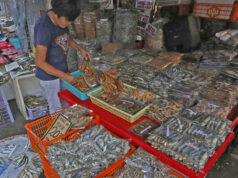Organic law ratification just the first step in the path to new Bangsamoro region
By Tajallih S. Basman
Correspondent
THE RATIFICATION of the Bangsamoro Organic Law (BOL) in the core of what would be a new autonomous region in Mindanao is a key step in the peace process as it paves the way for equally major, if not bigger, tasks needed to achieve inclusive, sustained economic development.
Moro Islamic Liberation Front (MILF) Chair Al Haj Murad Ebrahim, said in a telephone interview that his group has begun crafting a development plan consisting of quick-impact programs as well as short- and long-term programs “that can be felt up to the grassroots level.” “We have a group trying to synchronize with the development plan of ARMM (Autonomous Region in Muslim Mindanao) as well as the national economic plan,” Mr. Murad said.
Professor Miriam Coronel-Ferrer, former chairperson of the government panel that negotiated the peace deal with the MILF, said the 2014 World Bank-supported Bangsamoro Development Plan provides supporting studies for an economic blueprint for the new region. “With the funds they have, they should jump-start the planning and work with the private sector to start creating jobs. It would be bad policy if only government jobs are made available — that would be a formula for the old politics of patronage and corruption,” Ms. Ferrer said in a mobile phone message.
Former Presidential Adviser on the Peace Process Teresita Quintos-Deles, who now chairs InciteGov, a policy research and advocacy center, also said that it is crucial to roll out projects that will have immediate impact on the people while a new administrative system is being set up. “While government transition is undertaken, hopefully, as seamlessly as possible, the dividends of peace have to be felt on the ground — in the communities which have high expectations that the new BARMM (Bangsamoro Autonomous Region in Muslim Mindanao) will make an immediate felt difference in their lives,” Ms. Deles said.
Full transition from the existing ARMM to BARMM has a three-year timetable, with the first election of the region’s Parliament to take place in May 2022.
“The elective officials (of the existing ARMM) will join the Bangsamoro Transition Authority (BTA). The appointive ones, unless a new head of agency is appointed, will have to carry on their work,” said Bangsamoro Transition Commission (BTC) Commissioner Raissa H. Jajurie.
“The chief minister will have to submit a transition plan to the BTA working as a parliament and it must be approved by the BTA.”
The transition plan will provide a schedule for the various agencies, except for the health, education, and social welfare sectors, which will be automatically absorbed by the BARMM bureaucracy.
“We have always been preparing for this since we assumed office as OIC (officer-in-charge) in 2011. We have prepared the documents necessary for a smooth transition to the new regional entity,” said ARMM Governor Mujiv S. Hataman.
Ms. Deles said the job of putting in place a new bureaucracy involves a lot of nitty-gritty. “The BTA (has to be) set up and made operational, budget provided, governance housekeeping rules and procedures established… a new bureaucracy put into place with proper benefits issued to employees who are separated from service, intergovernmental bodies and protocols agreed upon,” she explained.
CRITICAL PHASE
Alongside the political and socioeconomic tasks, the Annex on Normalization under the Comprehensive Agreement on the Bangsamoro (CAB) between the government and the MILF also provides for the laying down of arms by the former rebel group.
“Normalization aims to ensure human security in the Bangsamoro. It helps build a society that is committed to basic human rights where individuals are free from fear of violence or crime and where long-held traditions and values continue to be honored,” the CAB states.
“MILF will turn in their firearms as well as decommission their combatants to the Independent Decommissioning Body (IDB),” explains Assistant Secretary Dickson P. Hermoso of the Office of the Presidential Adviser on the Peace Process (OPAPP).
Mr. Hermoso, who is involved in the normalization track, said the timetable provides for 30% arms decommissioning after the law is ratified, 35% after the formation of the Bangsamoro police, and the last 35% towards the end of 2022 when all requirements under the agreement will have been met.
“In 2015, MILF turned over 75 firearms and decommissioned 145 combatants as part of confidence-building with the government,” Mr. Hermoso recalled.
For initial post-ratification decommissioning, Mr. Murad said, “We have already submitted to the implementing panel the names of the combatants who will be decommissioned after the ratification as well as the number of weapons that will be decommissioned along with the combatants.”
This covers 12,000 combatants and some 2,000 firearms.
“This is the most tedious and meticulous part of the process,” Mr. Hermoso said.
“Following the decommissioning of the combatants, the next part is the reintegration. We have to profile and capacitate 40,000 combatants including their families and communities.”
The CAB also provides for the disbandment of private armed groups in the Bangsamoro territory as well as adjacent regions.
In 2015, the Philippine government, through Memorandum Circular No. 83, formed the National Task Force for the Disbandment of the PAGs (NTF-DPAGs).
“This is primarily the obligation of the national government, but we can also participate because we will have a Joint Peace and Security Teams (JPST) composed of our ‘undecommissioned’ members together with Philippine National Police (PNP) and Armed Forces of the Philippines (AFP),” said Mr. Murad.
The AFP will also be “redeploying” forces, especially in areas with “peculiar situations due to the ongoing martial law in Mindanao and other threats like extremism,” the MILF leader added.
To address justice-related concerns, the Transitional Justice and Reconciliation Commission (TJRC) recommended in 2016 the creation of a National Transitional Justice and Reconciliation Commission on the Bangsamoro (NTJRCB).
“There will ba a law to come out soon. That is one of the most important mechanisms of transitional justice,” said Mr. Hermoso, “To heal the scars that happened in the past.”
Mr. Murad said “this is very important because there are several issues related to it that is why it has to be resolved. We need to find solutions to the injustices committed against the Bangsamoro.”
A review of cases in relation to the Bangsamoro armed struggle, including the possibility of amnesty and pardons, will also be undertaken. “It will happen towards the end. This covers only political crimes (rebellion), but not heinous crimes such as rape, arson and murder,” said Mr. Hermoso.
By 2022, “All peace milestones should have been completed, at which time the panels of the two parties will reconvene to sign the exit agreement, indicating the parties’ consensus that the CAB has been fully implemented,” Ms. Deles said, “Only then can we say it is finished, inshaAllah (God willing)!”
“It’s still a long way to go,” said Ms. Ferrer, and the new Bangsamoro region — with the final geographical territory to be determined after the second plebiscite scheduled in adjacent areas on Feb. 6 — will need all the support from all sectors to “find their way to good, responsible and inclusive governance.”



